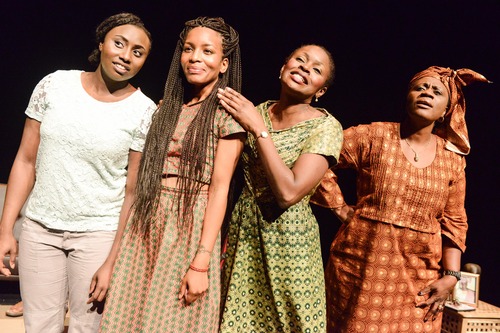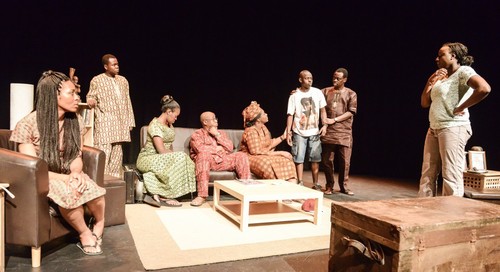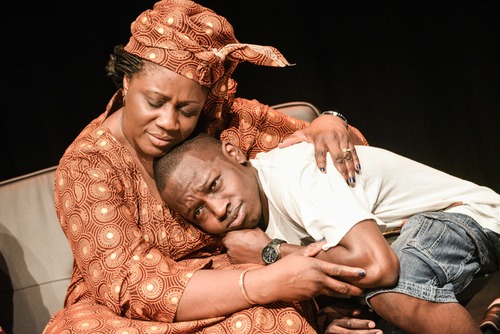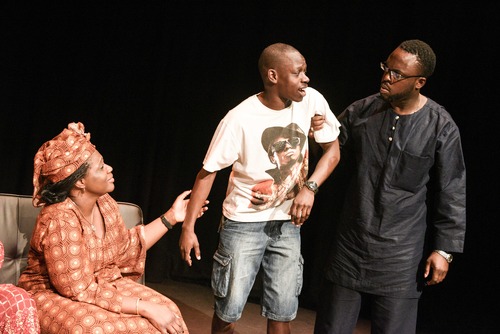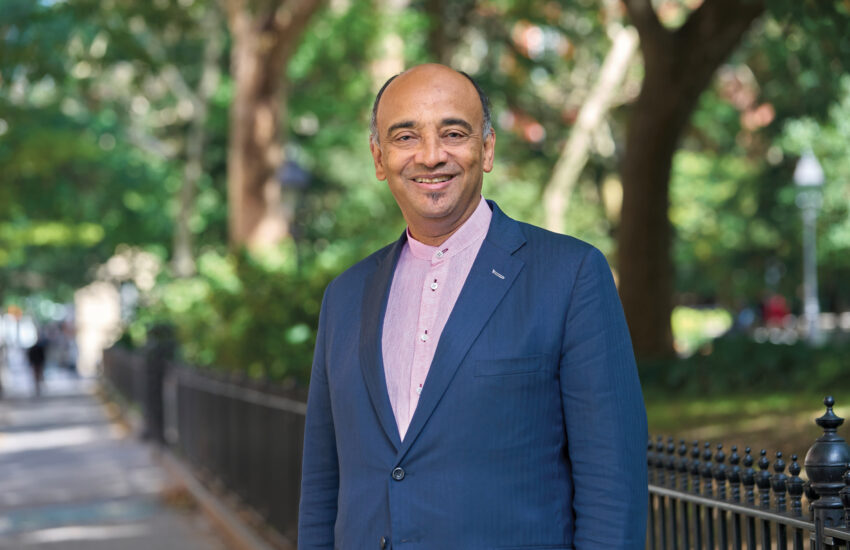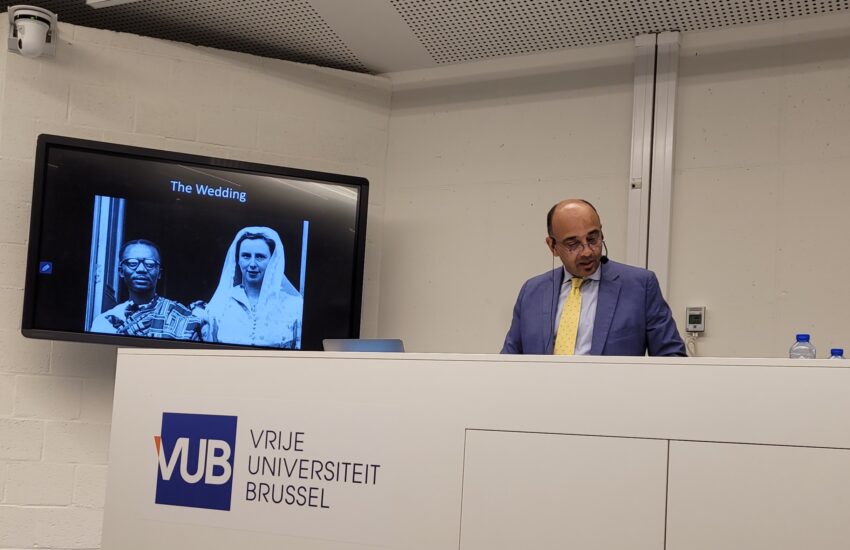Theatre Review: Pandora’s Box
By Vidal Montgomery
Something in me is tired of the narrative of affluent black people pontificating on how they can appear and act more ‘equal’ (for ‘equal’, read European) and I am also a little irritated by the narrative of the education system failing our kids (I don’t mind action, just the narrative alone gets on my nerves). As it happens I’d been visited by a couple of close friends who were proselytising about a trip to Africa – Southern Africa in particular – as a consequence of feeling that the education system in England was failing them as teachers. Thus a play steeped in traditional Nigerian education and family values seemed to me to be the perfect tonic, and the tipping point. Surely my Yoruba brothers from another mother would be secure enough in their African identity to shine a little light to lead the way? As luck would have it, Ade Solanke’s characters in Pandora’s Box are facing the same or similar dilemmas, albeit from the luxury, warmth – and occasional power outage – of Nigeria’s new middle class.
At the core of Pandora’s Box is a story of two generations of absent fatherhood, from the point of view of the mothers and daughters and sisters upon whom this impacts, and how that threatens to impact upon the main character’s son. The son, Timi, is in the all-too-familiar Afropean predicament of feeling forced to invent his own rites of passage into manhood from the detritus of the consumerism and violence he is bombarded with in London.
His mother brings him to Nigeria for what he thinks is a holiday. But like the stories of the Byzantine “holiday trips” (arranged marriages + passport confiscation) I experienced passively as a young black kid growing up in North London in the ‘80s and ‘90s, there is every possibility that the holiday can quickly turn into something else. The boy’s best friend, Tope, who was moved to a private school in Nigeria some years ago, laughs at his Westernised friend – Tope has picked up enough Yoruba to understand his aunties and mother and grandmother are bubbling and brewing over whether to “extend his stay” in Lagos like many cooks over a broth.
The fire for the cauldron comes from the relationship between the women. Pandora, the character after whom the play is named, having been faced with the same decision 40 years prior, opted to leave one daughter in Nigeria and stay with the other in London. To paraphrase Solanke: “One of them had the motherland, and one of them had a mother”.
The incendiary tempo of the war of words between the women flows like a furious free jazz solo; nobody likes to stand in the way of the righteous indignation of a black woman, but as the mother makes the point – in Africa there are “no black people; just people” – and so righteous indignation abounds from all quarters. Each of the women has an axe to grind and these axes are made sharper or filed away by the stony attitudes of womanhood vs culture, feminism vs consumerism, matriarchy vs community and many other paradigms for the Western psyche. Pandora’s brother makes occasional appearances as the sole family patriarch, and is at pains to remind the women of their responsibility to African traditions in a time when even he is unsure of what Nigeria has to offer a boy so steeped in British Culture. In this sense the play and its protagonists peel back the romantic notion of Africa as the motherland and deals with the lived everyday realities of a fifteen hundred year old civilisation in the background of a 3 million year old Afrikan culture.
Solanke’s script stealthily and dutifully discusses current and historical issues and perspectives in a forum and with an honesty which, quite frankly, is unrivalled in any of the debating halls, parliamentary chambers, conferences, seminars and workshops I have attended thus far in my life. The early Yoruba reference of one of the characters to diaspora returnees as “white black people” – even equating some Caribbean’s with a set of German tourists – shows that this show pulls no punches. In the Caribbean we say: “don’t use inside words outside”, but with this production the audience members were very quickly made to feel like part of the family.
It was fascinating to see the Nigerian take on British issues such as Damilola Taylor’s death, the Mark Duggan enquiry, and how traditional Nigerian family values could have avoided many of the associated problems, and, sometimes, where traditional staid Nigerian thinking had perhaps contributed to these problems, or threatened to contribute in the future. The cast may have been actors, but they never lost that essence of real people talking about real diaspora issues, with all the honest expression and completely insensitive – painful – timing that happens in real black families, in London or in the motherland.
And yes, Pandora does actually have a box in the play; the casket of family treats and trinkets shipped back form England to the motherland. But the opening was not the great reveal one might have been led to believe from this title, rather the slow dripping radioactivity of a shard of kryptonite somewhere in the casket of dead memories that slowly and momentarily turned each of the Afrikan superwomen into jaded, bitter versions of themselves, spewing toxic venom of secrets held close to chests for decades. I think this is why the Asante women of old were known to cover their lips with their fingers and say to their daughters “hold your weapon”. In this play those lips are given free reign, and there is much friendly fire in the apocalyptic wedding of words from two worlds.
In Pandora’s Box, we are presented with the idea that “A generation must first discover its mission, and then fulfil it” – this show went a long way into exploring what that mission might be, and who can find it for whom, and who needs time and space to work out their own way.
Something told me that the Bernie Grant Centre would be the perfect setting for this production and, notwithstanding a few latecomers munching their way through packets of crisps and sweets (I guess theatre’s changed a lot since I last went, but great to see the young people coming in … by any means necessary… sigh) I think the venue, cast, crew and performers all seemed to be working well together. The props did not really reflect the grandeur of the Naija lifestyle that the text totally captures, but I imagine that, being on an Arts Council budget, the playwright invested heavily in developing the artists, instead of the fixtures and fittings. In any case, what they delivered, and the synergy with which they delivered it, paid dividends. The full house and hearty laughs and rapport throughout the show are the only vote that counts. Awards will surely follow.
Article by Vidal Montgomery
Photos by Robert Day
For future UK tour details log on to www.facebook.com/SporaStories www.sporastories.com @sporastories

